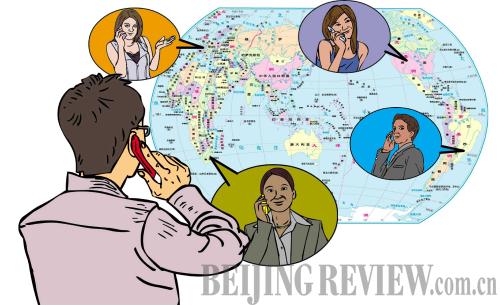|
 |
|
(LI SHIGONG) |
Today's modern world has increased the speed in the way we as individuals and as cultural groups, think, feel, and respond to our world and the people in it with us. This is because of enormous changes in media and migration. Digital media (Internet, cell phones) and migratory freedoms offer savvy youth in particular more access to all kinds of resources, both tangible and intangible.
The tangible are easily guessed: e.g., things like consumer goods and vacation trips. But the intangible is worth discussing, because it belongs to the realm of ideas and imagination. Our digital age, combined with advanced mobility, has transformed the way people communicate and how we conduct ourselves. It has, in effect, enhanced our chances for an expanded communicative competence—which implies not only linguistically correct communication, but also socially appropriate ways of speaking and behaving. In China, it is easier to be bilingual and bicultural than ever before.
The Internet and cellphones, moreover, have transformed styles of everyday discourse. They allow us as communicators, to give additional agency to creating a unique and dynamic identity for ourselves. These tools give us more opportunities to interact with a more diverse set of people, anywhere in the world. That's pretty amazing. Just watch a savvy Chinese teenager simultaneously Skypeing several friends, all in different cities of the world.
Similar to new media, motion or migration also has the ability to generate a new way of viewing others, interacting with them and be viewed in return. This, essentially, is identity making. As a guest here in China, I can watch a French film while sitting in Hohhot eating a Mongolian meal with my Han friends. As the great Indian thinker Appadurai said, media and mobility generate "diasporic public spheres; phenomenon that confound those that depend upon the continued salience of the nation state as the key arbitrator of social changes." Thus, mobility and media have the ability to set us free.
How can this be? We all know the woes of globalization, of how cultures are being destroyed and that everyone will end up speaking English before they are 50. There lies truth in the arguments of global capitalism and the media, walking hand in hand to create consumers of pap, drudging workers addicted to fast food.
But mobility and media can also be viewed as powerful influences on the way people imagine their worlds, selves, and futures. Myriad cyber-spaces, instantly available online, allow us to access and choose ideas from a global repertoire. We may utilize them to transform our local, everyday practices. Imagination, and in effect—identity & culture making—have become easier, a more public, collective reality.
This also implies that cultures, and the people belonging to them, are more dynamic, more transformative, than ever before in human history. The logic of everyday life, the stability and certainty of a community or group, is no longer a given, no longer sequestered. Media and migration have opened avenues for immediate and powerful social change.
This kind of change is also more socialist in nature. A society in need of change no longer depends upon one charismatic leader, a Sequoia or a Castro; we no longer need to wait for a rare genius, a Graham Bell or a Steve Jobs. Instead, anyone can go online and tune into endless sources of creative ideas that can be employed to positively stimulate imaginations and support societies.
In China and other parts of Asia, parents routinely tell me that their children are going to study, work, and live in places far away from home. Clearly, migration at all socioeconomic levels has increased globally. Whether based on wretchedness—a diaspora of terror for refugees, or of hope—a diaspora of Chinese post-docs, all these migrants take their cultural imaginations with them. Such narratives and world views are fusing and transforming the people they will live alongside, and vice versa. Hybrid cultures, like mushrooms after rain, are thus created.
I am not ignoring the wretched or the fact that mass media does go hand in hand with global imperialism. Rather, I assert that consuming resources also provokes resistance, and offers agency to marginalized folk. Just listen to Mongolian rap or read contemporary Chinese fiction, and you will get a sense of the fusion of ideas, the global consciousness of the so-called mundane world. Remember: Imagination via media and mobility can generate action as well as consumption. Revolutions come from ideas, just as spare tires come from too much McDonald's.
The author is an American living in Hohhot, north China's Inner Mongolia Autonomous Region |
